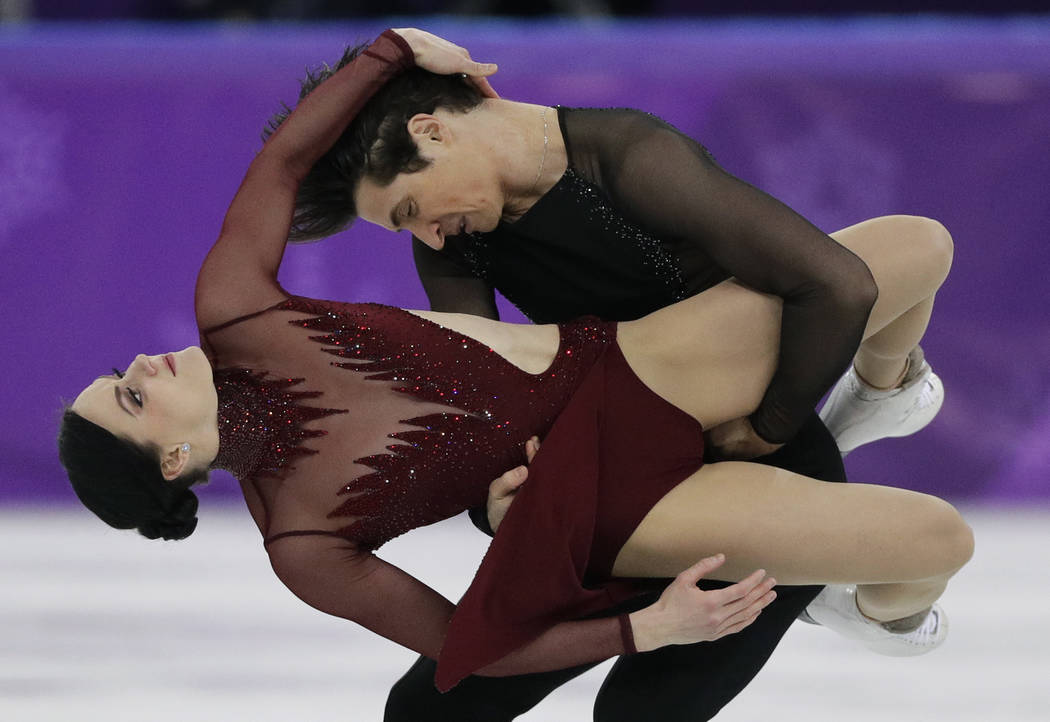Canadians Virtue, Moir win ice dance for 3rd career Olympic gold

GANGNEUNG, South Korea — Tessa Virtue and Scott Moir were the last couple to leave the ice after their warmup early Tuesday, the Canadian ice dancers soaking in every second before their final Olympic performance.
They sure made it a memorable one.
After training partners Gabriella Papadakis and Guillaume Cizeron broke the world record with a flawless free skate, Virtue and Moir took the ice one last time with a dazzling, dramatic interpretation of “Moulin Rouge.” Every movement was synchronized, every element raw and emotional, the only question left inside Gangneung Ice Arena was whether it would be enough.
The score: a personal-best 122.40 points, and a record 206.07 total, pushing them past their French rivals’ score of 205.28 and making them the most decorated figure skaters in Olympic history.
“We didn’t know we had won, that’s for sure,” Moir said with a laugh. “We really committed to our training because we knew we’d have to be better than we’ve ever been.”
They were better than anybody has ever been.
It was the second gold medal of the Pyeongchang Games for Virtue and Moir, who were instrumental in helping Canada win the team event . It was also their third gold overall after winning their home Olympics in Vancouver in 2010, and their fifth total medal after two silvers at the 2014 Sochi Games.
They briefly retired after that disappointment, seemingly content with their place in history, only to decide a couple years ago to make one more run at Olympic glory.
Now, they’re being called the greatest ice dancers ever.
“I mean, it’s incredibly flattering,” Virtue said, “but it’s hard to wrap our heads around so close to the event. We’re grateful for the legends that came before us and really paved the way.”
Virtue and Moir’s medal total broke a tie with Russia’s Evgeni Plushenko and Sweden’s Gillis Grafstrom for the most in Olympic figure skating, and their golden haul matched the record shared by Grafstrom, Sonja Henie of Norway and Irina Rodnina of the Soviet Union.
“They’re a once-in-a-generation talent,” said Patrice Lauzon, who along with his wife, Marie-France Dubreuil, coaches the Canadians and French at their school in Montreal.
American siblings Maia and Alex Shibutani won the bronze medal with a near-flawless free skate to “Paradise” by Coldplay. Their total of 192.59 points made up the two-hundredths of a point they trailed teammates Madison Hubbell and Zachary Donohue, leaving them fourth.
“It was amazing to finally have that Olympic moment,” Alex Shibutani said. “We didn’t really think about results. If we did the best we could, we were going to be satisfied.”
The third American team, Madison Chock and Evan Bates, also was within sight of the podium after the short dance. But a rare and stunning fall entering their combination spin was enough to damage an otherwise beautiful performance to “Imagine” that still drew an emotional applause.
Meanwhile, the race for the gold medal came down to two teams a cut above the rest.
Virtue and Moir have been the standard bearers for the better part of a decade, the longest-tenured ice dance team in Canadian history. They carried the Maple Leaf flag into the opening ceremony, and their rock-inspired Latin short dance Monday broke their own world record.
Papadakis and Cizeron were the new rivals on the scene, bringing a fresh, contemporary style that had won the judges over. They upset the Canadians at the Grand Prix Final in December, then set the world record with their elegant, mesmerizing performance at last month’s European championships.
The French couple, whose wardrobe malfunction in the short dance made them a trending topic worldwide, drew the penultimate starting number for Tuesday’s free dance. They put on a program that former ice dancer Meryl Davis described as “art in motion” — their lifts were effortless, choreographed elements smooth and synchronized twizzles as if they were tied together.
Their score of 123.35 points was exactly what they needed to make a case for gold.
“We did the best we could, an amazing performance,” Papadakis said, “so then there’s nothing else you can do. You sit back and enjoy.”
The unflappable Virtue and Moir answered the challenge with 4 minutes to last a lifetime, a short dance certain to go down in Olympic history. The throaty, gritty portion of “El Tango de Roxanne” had the crowd roaring, and their finishing lift was a fitting conclusion to an exemplary performance.
Not to mention their exemplary careers.
“They were born under good stars,” Dubreuil said with a smile, “because they found each other at a young age, and it’s a partnership that kept growing. I mean, 20 years of skating together. Eyes closed, they know what they’re doing. It’s something spectacular.”
AP Sports Writer Barry Wilner contributed to this report.